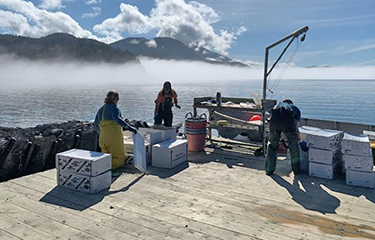The administration of U.S. President Joe Biden, the U.S. Department of Commerce, and NOAA announced an additional USD 20 million (EUR 18.9 million) in funding for NOAA to assist regional fishery management councils with tackling the impact of climate change on fisheries management.
The funding, according to a release from NOAA, will be provided via the Inflation Reduction Act to support the various councils’ work on climate-related fisheries management and implementation.
“The regional fishery management councils are critical partners in the development of conservation and management measures for our nation’s marine fisheries,” U.S. Secretary of Commerce Gina Raimondo said in a release. “This funding, through the Biden-Harris Administration's Inflation Reduction Act, a key pillar of Bidenomics, supports important council work to improve climate resiliency and responsiveness to climate impacts.”
The USD 20 million will be divided into USD 3 million (EUR 2.8 million) and USD 17 million (EUR 16 million) portions. The USD 3 million will be divided among the eight regional fishery management councils, and the remaining USD 17 million will be awarded to councils after they identify priority projects working toward two key goals.
The first goal, NOAA said, is to develop fishery management measures that can improve climate resiliency and responsiveness to climate impacts. The second goal, it said, is to determine how to implement those management measures – including in ways to help serve underserved communities.
Fishery management councils in the U.S. have already had to grapple with some of the effects of climate change. The New England Fishery Management Council has had to change its cod and haddock management strategies as climate change results in changes to the stock. The Atlantic cod fishery in Maine, for example, was closed after it crashed to a record low in 2017 and never recovered.
A climate change report issued as early as 2018 predicted drastic changes in the U.S. marine economy as climate change began to shift fish stocks. Also in 2018, the Atlantic States Marine Fisheries Commission decided to shift menhaden quotas as the species began to show up in larger numbers in the U.S. state of Maine – which scientists speculate is a direct result of climate change moving the species further north.
The funding for U.S. management councils isn’t the only government funding being devoted to analyzing how to react to climate change’s impacts on fish stocks. The U.S. Department of Defense recently awarded a grant to an Oregon State University researcher to predict how climate change could result in conflicts over fishing rights.
“Changing ocean conditions are affecting the location and productivity of fish stocks, which can have significant social and economic impacts on fisheries and fishing-dependent communities,” NOAA Fisheries Assistant Administrator Janet Coit said. “Working together with our fishery management council partners, we'll continue to advance our efforts to use the best available science to develop and implement fisheries management strategies in the face of climate change.”
Photo courtesy of NOAA







